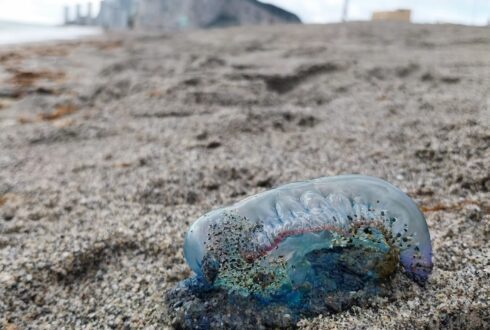In the south of Spain, a WAVE of Portuguese Man O’War has washed ashore.
Authorities are warning the public to stay away from La Línea’s Levante and Santa Bárbara beaches neighbouring Gibraltar after a mass stranding marked this season’s first major arrival of these dangerous marine organisms.
The strong winds that blow from the west have carried this highly toxic species of marine organisms that is often mistaken as jellyfish.
The appearance of these birds coincides with the changing patterns of spring currents in Strait of Gibraltar.
READ MORE Five teenagers are arrested after a major supermarket fire in Gibraltar

Since early in the morning, teams of cleaners have been at work to remove these creatures. They can be identified by their blue-tinted gas-filled sacs, which can grow up to 30cm.
Officials warn of the possibility that more specimens will arrive in coming days, due to persistent weather conditions.
It is advised that the public not touch these tentacles, even when they are beached. They can still be venomous after death, and sting through gloves.
READ MORE ‘We envy how the UK treats Gibraltar’: Mayor of Spanish border town slams Spain’s ‘lack of support’ for La Linea

When their tentacles touch you, they cause immediate pain that can be severe and lead to potentially fatal reactions such as respiratory distress and cardiac arrest.
They can cause severe harm with just a short contact.
Avoid common folk remedies, such as urine or vinegar, that may worsen the sting.
Remove any visible tentacles using tweezers and rinse the area with seawater.
 Costa News Spain Breaking News | English News in Spain.
Costa News Spain Breaking News | English News in Spain.





